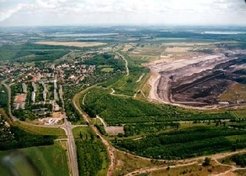Political Economy and Political Clientelism in the Agricultural and Industrial Region South of Leipzig
Political Economy and Political Clientelism in the Agricultural and Industrial Region South of Leipzig
Land

Land has been called "the supreme good," and ownership and usufruct of land is one of the most important topics of this project. Of special interest are two types of conflict involving land: (1) the conflict between liberal and socialist policies of land ownership and agricultural production and (2) the conflict over the use of land for agricultural, industrial, residential, or recreational purposes. The relevant aspects of the first of these conflicts include the expropriation of land during the land reform of 1945, the collectivization of agriculture from the 1950s to the 1970s, the industrialization of agricultural production in the 1970s and 1980s, and the restitution of private property and the privatization of agricultural production beginning in 1990. While developments in the field of agriculture followed roughly the same pattern throughout Eastern Germany, conflicts over the agricultural, industrial, residential, or recreational use of land have taken an extreme form in the Southern Region of Leipzig. The various aspects of this conflict include regional planning, industrial policy, changing laws concerning the ownership of subterranean resources, the expropriation of land for the purposes of industry, the compensation of landowners by industry, and the evacuation, devastation, and resettlement of whole villages. In the twentieth and early twenty-first centuries, conflicts over land use have, of course, occurred under widely varying political and legal circumstances. This means that there has been little consistency in the treatment of the affected landowners.
Employment and Entitlements
In an expanded definition of "property," employment and entitlements must be included, since these terms designate legal arrangements which allow actors to gain access to a wide range of resources. In this project, the focus will be on labor policy, the labor market, salaries, social security, and actors' experiences with work, unemployment, and retirement. Once again, changing political conditions must be taken into account, with special emphasis on the differences between the socialist era and the current era. Given the significance of early retirement as a strategy for alleviating unemployment after 1990, special attention will be given to pensions and pensioners.
